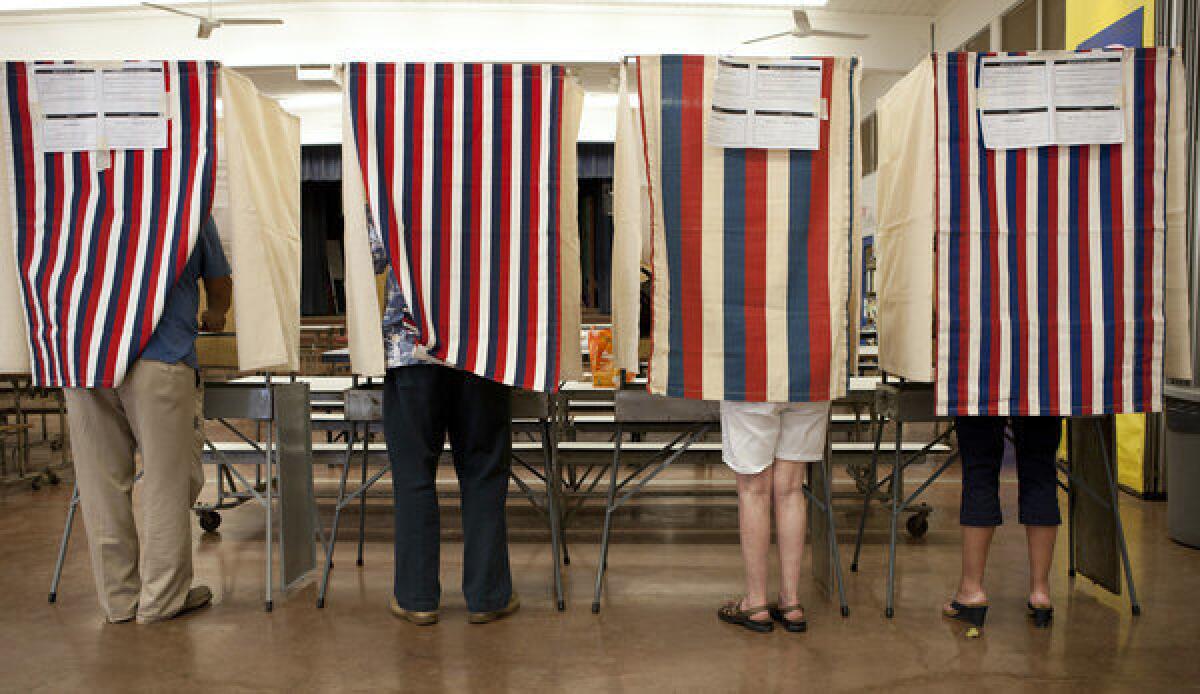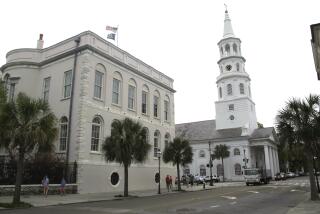Honolulu elects mayor who supports big rail project

- Share via
Former House Majority Speaker Kirk Caldwell won an easy victory Tuesday to become Honolulu’s mayor in an election that was widely seen as a referendum on the city’s controversial $5.2-billion rail project.
Caldwell, who was formerly acting mayor of the city, defeated former Gov. Ben Cayetano, who had emerged from retirement largely with the goal of halting the 20-mile-long rail project, which he says is too costly and will do little to relieve the city’s worsening traffic congestion.
Caldwell took 53% of the vote to Cayetano’s 45% after starting the campaign at the back of the pack. Incumbent Mayor Peter Carlisle was defeated in the Aug. 11 primary, which sent the two front-runners into a runoff with Cayetano initially holding a substantial lead.
LIVE ANALYSIS: The Times breaks down Election Day
The closely watched race eclipsed other campaigns in Hawaii, which also saw Democratic U.S. Rep. Mazie Hirono defeat Gov. Linda Lingle for the U.S. Senate seat being vacated by Sen. Daniel Akaka.
Cayetano, despite his history as a blue collar Democrat, sprang into the race at the beginning of the year as a front-runner, supported by a number of business and Republican leaders who worried the rail project will run into expensive cost overruns and leave roads just as congested as they are now. In rice-and-chili feeds across the city, the two-term former governor showed slide shows predicting the elevated rail line will mar views near the downtown waterfront. He proposed an alternative, $1.5-billion plan to expand bus routes, build a new freeway flyover and expand cross-flow commuter lanes.
Caldwell received substantial financial backing from Pacific Resource Partnership, an independent group tied to the carpenters union. The group financed a stream of attack ads resurrecting an old campaign finance scandal from Cayetano’s years as governor — when he was cleared of any wrongdoing — and challenging pardons he had granted to convicted criminals, most granted on the recommendation of parole and public safety authorities.
“This election was very divisive,” Caldwell, swathed in leis, said in a victory speech, in which he said he “didn’t like” the negative campaigning that preceded the election.
But he emphasized: “It’s not us against them. It’s not bus vs. rail. It’s about coming together, it’s about working together to make this a better place.”
Caldwell said the rail system will allow the island of Oahu to make way for substantial planned growth along the rail corridor while preserving the island’s agricultural lands and green spaces and preventing sprawl.”
PHOTOS: America goes to the polls
“If we do this right and we do come together, we can set our city and our island on a new course, unlike the last 50 years since statehood. Where we live better in the urban core, making better use of our urban zoned lands,” he said.
“Never in my wildest dreams did I even contemplate that an organization like PRP with members that are anonymous would come out and spend $3 million to attack me, my character, my name and my reputation,” Cayetano, who was governor from 1994 to 2002, said as he conceded defeat Tuesday night.
The rail project has been temporarily halted by a pair of court rulings that ordered additional studies. But officials at the Honolulu Authority for Rail Transit have said they are confident they can complete the studies without substantial additional delay.
The rail line, the biggest municipal public works project in Hawaii’s history, will run from the west Oahu suburb of Kapolei to the Ala Moana shopping center on the edge of Waikiki.
Follow Politics Now on Twitter and Facebook
More to Read
Get the L.A. Times Politics newsletter
Deeply reported insights into legislation, politics and policy from Sacramento, Washington and beyond. In your inbox twice per week.
You may occasionally receive promotional content from the Los Angeles Times.










